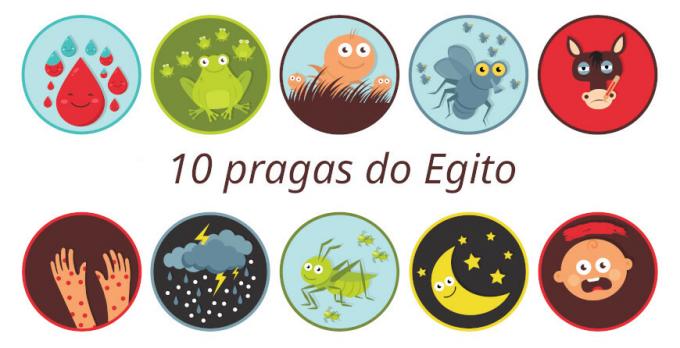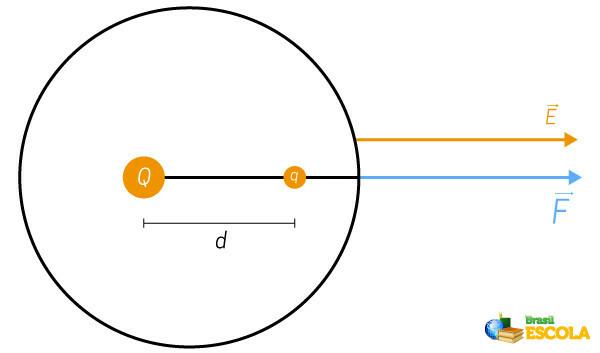The ten plagues of Egypt are a biblical narrative that mentions ten plagues that were sent by God to punish the Egyptians in ancient times. These plagues happened because the pharaoh, Ramses II, was refusing to give freedom to the Hebrews and allow them to return to his land, Canaan.
Historians understand that this narrative has no factual proof and is, therefore, a myth. However, some researchers point out that great tragedies may have happened in Egypt due to a large volcanic eruption that took place on a Greek island around 1600 BC. W.
Read too: Who are the 12 main Greek gods?
Summary of the ten plagues of Egypt
The ten plagues are a biblical narrative that is found in the book of Exodus.
This narrative mentions the story of ten plagues that were sent by God to punish Egypt.
These punishments happened because the Hebrews were slaves in Egypt and were not freed by Pharaoh Ramses II.
At the end of the tenth plague, the Hebrews would have received permission from Pharaoh to leave.
Historians consider this narrative to be a myth.
Ten plagues of Egypt in the Bible
The Bible is the holy book of Christianity. It is full of stories that deal with God, Jesus and history of the Hebrews, people chosen by God, according to the Christian narrative. One of these stories deals with the liberation of the Hebrews (also called Israelites) of slavery in ancient Egypt and is mentioned in the book of Exodus.
History of the ten plagues of Egypt
The biblical text says that God wanted to free thes Hebrews of slavery to take them to Canaan, where they could worship him. This narrative tells that the Egyptians, governed by Ramses II, refused to give freedom to the Hebrews, and, therefore, God sent ten plagues with the intention of punishing Egypt.
The ten plagues were sent by God through Moses, chosen to communicate to Pharaoh about God's desire for the Hebrews to be freed from slavery. The biblical narrative tells that with each plague sent by God, the pharaoh was convinced to give freedom to the Hebrews, but he changed his mind as soon as the plague was ended.
That every time Pharaoh refused to give in to God's requests, a new plague was sent. Christians understand that this narrative is also a demonstration by God to show his superiority in relation to the Egyptian gods, since the biblical text suggests in some passages that Egyptian priests were unable to replicate the plagues sent by God.
See too: What was religion like in Ancient Egypt?
List of the ten plagues of Egypt
The biblical text tells us that the ten plagues were listed below:

Water turned into blood: The biblical account says that the waters of rio Nile they were turned into blood, and the beings that inhabited the river died.
Frogs: In this plague, a large number of frogs left the marshy regions and invaded people's homes in Egypt.
Lice: The Egyptians began to suffer from a large infestation of lice, which caused numerous problems. The Egyptians' animals were also affected by this plague.
Flies: a swarm of flies appeared in Egypt, causing a lot of discomfort to people. The number of flies was so high that the sky was covered by the swarm. This plague brought trouble only to the Egyptians.
Plague and death of animals: In the fifth plague, a terrible plague spread through the Egyptian livestock, causing the animals to fall ill and many to die. This plague only affected the Egyptian livestock, as the narrative mentions that the Hebrew flocks remained unharmed.
Wounds on the body: In the sixth plague, all Egyptians were affected by large and painful wounds. The Hebrews suffered no harm, while the Egyptians suffered from the plague.
Hailstorm: This plague caused a lot of misinterpretation, but the current understanding is that in this plague, large boulders of ice fell from the sky during huge storms. These stones would have killed people and destroyed part of Egyptian crops.
Locusts: Egypt was taken over by a large swarm of locusts that invaded Egyptian homes and crops. Locusts destroyed crops.
Darkness: Egypt was hit by a strong darkness that lasted for three days. The darkness was so deep that people couldn't see each other.
Death of firstborns: In the last plague, God would have sent the angel of death to Egypt so that all the firstborn were killed. In this plague, all the firstborn among humans and animals were killed. The Hebrews were unharmed by this plague because they celebrated the first Passover and followed the instructions given by Moses.
Consequences of the ten plagues of Egypt
The biblical account says that after the last plague, Pharaoh would have authorized the Hebrews to abandon Egypt and return to Canaan. Pharaoh would have ordered the Hebrews to take everything they owned, including their animals. This episode it started à saga of the Hebrews on their return à promised land.
Know more: Easter — how the story of the liberation of the Hebrews gave rise to this celebration
Ten plagues of Egypt: myth or truth?
The historiography there is no proof that the events described in this biblical story are real. Therefore, the prevailing opinion among historians is that the ten plagues of Egypt are, in fact, a mythical narrative which was part of the oral culture of the Hebrews.
This does not mean that there are no researchers who seek to find some veracity in the narrative of the ten plagues of Egypt. Many dedicate themselves for years to trying to understand this narrative and find some evidence to prove it.
Some researchers theorize that a volcanic eruptionon a Greek island, around 1600 BC. C., would have been the event that caused so many tragedies successive events in Egypt. This hypothesis states that despite the distance, this volcanic eruption was responsible for a series of side effects that caused some tragedies in Egypt. This theory, however, is nothing more than a theory, as there is no proof ofThe relationship between the volcanic eruption and the plagues of Egypt.


